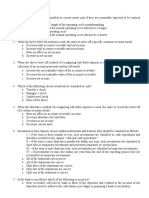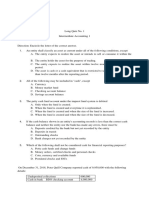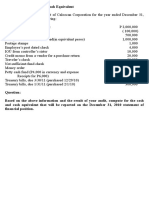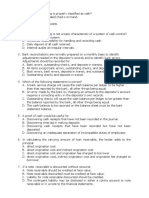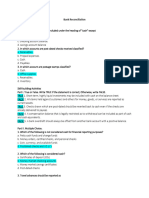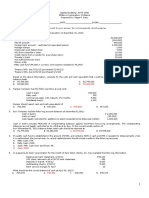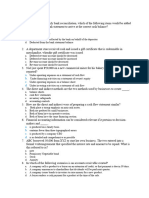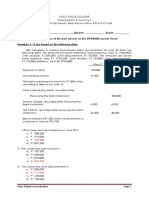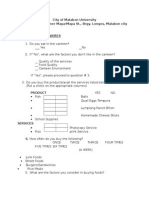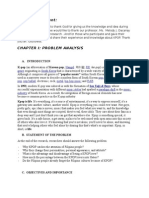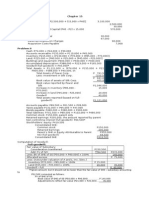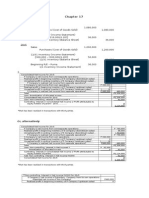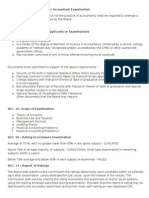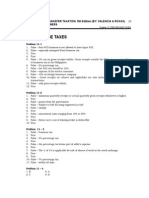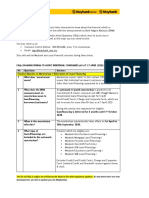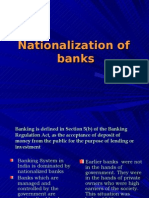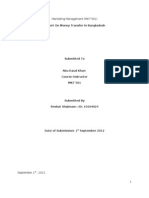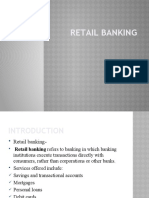AP - Audit of Cash
AP - Audit of Cash
Uploaded by
Rose CastilloCopyright:
Available Formats
AP - Audit of Cash
AP - Audit of Cash
Uploaded by
Rose CastilloOriginal Description:
Original Title
Copyright
Available Formats
Share this document
Did you find this document useful?
Is this content inappropriate?
Copyright:
Available Formats
AP - Audit of Cash
AP - Audit of Cash
Uploaded by
Rose CastilloCopyright:
Available Formats
Auditing Problems: Audit of Cash and Cash Equivalents
In connection with your audit of Caloocan Corporation for the year ended December 31, 2010,
you gathered the following:
Current account at Metrobank
Current account at BPI
Payroll account
Foreign bank account restricted (in equivalent pesos)
Postage stamps
Employees post dated check
IOU from controllers sister
Credit memo from a vendor for a purchase return
Travelers check
Not-sufficient-funds check
Money Order
Petty cash fund (P4,000 in currency and expense
receipts for P6,000)
Treasury bills, due 3/30/11 (purchased 12/29/10)
Treasury bills, due 1/31/11 (purchased 2/1/10)
P2,000,000
(100,000)
500,000
1,000,000
1,000
4,000
10,000
20,000
50,000
15,000
30,000
10,000
200,000
300,000
1. Based on the above information and the result of your audit, compute for the cash and cash
equivalents that will be reported on the December 31, 2010 statement of financial position.
a. P2,784,000
c. P2,790,000
b. P3,084,000
d. P2,704,000
The information below was taken form the bank transfer schedule prepared during the audit of
Khaye Ting Companys financial statements for the year ended December 31, 2010. Assume all
checks are dated and issued on December 30, 2010.
No.
101
102
103
104
From
Pbcom
UCPB
HSBC
MBank
To
HSBC
Mbank
PSBank
PNB
Disbursements
Per
Per
Books Bank
12/30
1/4
1/3
1/2
12/31
1/3
1/2
1/2
Reciepts
Per
Per
Books
Bank
12/30
1/3
12/30
12/31
1/2
1/2
1/2
12/31
2. Which of the following checks might indicate kiting?
a. Checks Nos. 101 and 103
b. Checks Nos. 102 and 104
c. Checks Nos. 101 and 104
d. Checks Nos. 102 and 103
3. Which of the following checks illustrate deposits/transfer in transit at December 31, 2010?
a. Checks Nos. 101 and 102
b. Checks Nos. 101 and 103
c. Checks Nos. 102 and 104
d. Checks Nos. 103 and 104
4. Two months before year-end, the bookkeeper erroneously recorded the receipt of a long-term
bank loan by a debit to cash and a credit to sales. Which of the following is the most effective
procedure for detecting this type of error?
a. Analyze bank confirmation information
b. Analyze the notes payable journal.
c. Prepare year-end bank reconciliation.
d. Prepare a year-end bank transfer schedule.
5. Postdated checks received by mail in settlement of customers accounts should be
a. Returned to customer.
b. Stamped with restrictive endorsement.
c. Deposited immediately by the cashier.
Page 1 of 4
JTT061588
Auditing Problems: Audit of Cash and Cash Equivalents
d. Deposited the day after together with cash receipts.
6. The cashier of Weakness Company covered a shortage in the cash working fund with cash
obtain at December 31 from a bank by cashing but not recording a check drawn on the
company out of town bank. How would you as an auditor discover the manipulation?
a. By confirming all December 31 bank balances.
b. By counting the cash working fund at the close of business on December 31.
c. By investigating items returned with the bank cut-off statements of the succeeding
month.
d. By preparing independent bank reconciliations as of December 31.
7. An essential phase of the audit of the cash balance at the end of the year is the auditors review
of cutoff bank statement. This specific procedure is not useful in determining if
a. Kiting has occurred.
b. Lapping has occurred.
c. The cash receipts journal was held open.
d. Compare the daily cash receipts totals with the bank deposit
8. Which of the following sets of information does an auditor usually confirm on one form?
a. Cash in bank and collateral for loans.
b. Accounts payable and purchase commitments.
c. Accounts receivable and accrued interest receivable.
d. Inventory on consignment and contingent liabilities.
9. The primary purpose of sending a standard confirmation request to financial institutions with
which the client has done business during the year is to.
a. Corroborate information regarding deposit and loan balances.
b. Provide the data necessary to prepare a proof of cash.
c. Detect kiting activities that may otherwise not be discovered.
d. Request information about contingent liabilities and secured transactions.
10. An auditor ordinarily sends a standard confirmation request to all banks with which the
client has done business during the year under audit, regardless of the year-end balance. A
purpose of this procedure is to
a. Request a cutoff bank statement and related checks be sent to the auditor.
b. Detect kiting activities that may otherwise not be discovered.
c. Seek information about contingent liabilities and security agreements.
d. Provide the data necessary to prepare a proof of cash.
11. As one of the year-end audit procedures, the auditor instructed the clients personnel to
prepare a standard bank confirmation request for a bank account that had been closed during
the year. After the clients treasurer had signed the request, it was mailed by the assistant
treasurer. What is the major flaw in this audit procedure?
a. The CPA did not sign the confirmation request before it was mailed.
b. Sending the request was meaningless because the account was closed before year-end.
c. The confirmation request was signed by the treasurer.
d. The request was mailed by the assistant treasurer.
Cash in bank balance of Novaliches Co. on January 1, 2010 was P1,400,000 representing 35%
paid-up capital of its authorized share capital of P4,000,000. During the year you ascertained the
following postings to some accounts, as follows:
Petty cash fund
Accounts receivable trade
Subscription receivable
Delivery equipment
Accounts payable trade
Bank loan
Accrued expenses
Subscribed share capital
Unissued share capital
Debit
P 40,000
9,000,000
1,200,000
1,000,000
5,600,000
700,000
Credit
P5,800,000
1,000,000
8,600,000
1,600,000
30,000
1,200,000
2,600,000
Page 2 of 4
JTT061588
Auditing Problems: Audit of Cash and Cash Equivalents
Authorized share capital
Sales
Purchases
Expenses (including depreciation of
P100,000 and accrued expenses of
P30,000)
4,000,000
9,000,000
8,600,000
1,800,000
12. The cash in bank balance at December 31, 2010 is
a. P830,000
c. P690,000
b. P660,000
d. P790,000
Quezon Metals Company
Condensed Comparative Income Statements
For the Years Ended December 31, 2010 and 2009
2010
P14,244,000
11,156,000
3,088,000
2,084,000
P 1,004,000
Net Sales
Cost of Goods Sold
Gross Profit
Expenses
Net Income
2009
P13,016,000
10,272,000
2,744,000
1,944,000
P 800,000
Additional information for Quezon:
(a)
All accounts receivable and accounts payable relate to trade merchandise.
(b)
The proceeds from the notes payable were used to finance plant expansion.
(c)
Share capital was sold to provide additional working capital.
Based on the above and the result of your audit, compute the following for 2010:
13. Cash collected from accounts receivable, assuming all sales are on account.
a. P14,012,000
c. P14,476,000
b. P 796,000
d. P16,508,000
14. Cash payments made on accounts payable to suppliers, assuming that all purchases of
inventory are on account.
a. P11,368,000
c. P10,944,000
b. P11,212,000
d. P11,256,000
15. Cash Payments for dividends.
a. P 828,000
c. P 668,000
b. P1,020,000
d. P1,180,000
16. Cash receipts that were not provided by operations.
a. P192,000
c. P700,000
b. P500,000
d. P
0
17. Cash payments for assets that were not reflected in operations.
a. P1,412,000
c. P 508,000
b. P 744,000
d. P1,176,000
Shown below is the bank reconciliation for Marikina Company for November 2010:
Balance per bank , Nov. 30, 2010
Add: Deposits in transit
Total
Less: Outstanding checks
Bank credit recorded in error
Cash balance per books, Nov. 30, 2010
P150,000
24,000
174,000
P28,000
10,000
38,000
P136,000
The bank statement for December 2010 contains the following data:
Page 3 of 4
JTT061588
Auditing Problems: Audit of Cash and Cash Equivalents
Total deposits
Total charges, including an NSF check of P8,000
and a service charge of P400
P110,000
96,000
All outstanding checks on November 30, 2010, including the bank credit, were cleared in the
bank in December 2010.
There were outstanding checks of P30,000 and deposits in transit of P38,000 on December 31,
2010.
Based on the above and the result of your audit, answer the following:
18. How much is the cash balance per bank on December 31, 2010?
a. P154,000
c. P164,000
b. P150,000
d. P172,400
19. How much is the December receipts per books?
a. P124,000
c. P110,000
c. P 96,000
d. P148,000
20. How much is the December disbursements per books?
a. P96,000
c. P89,600
b. P79,600
d. P98,000
21. How much is the cash balance per books on December 31, 2010?
a. P150,000
c. P180,400
b. P170,400
d. P162,000
22. The adjusted cash in bank balance as of December 31, 2010
a. P141,600
c. P172,000
b. P162,000
d. P196,000
Page 4 of 4
JTT061588
You might also like
- SortCodes of Zambian LocalBanksDocument4 pagesSortCodes of Zambian LocalBanksMalumbo Sinkamba80% (5)
- DRAFT Reply of The Notice US 13 2 of Securitization and Reconstruction of Financial Assets and Enforcement of Security Interest Act2002Document4 pagesDRAFT Reply of The Notice US 13 2 of Securitization and Reconstruction of Financial Assets and Enforcement of Security Interest Act2002raj singh100% (2)
- Tata Capital PL ClosureDocument1 pageTata Capital PL ClosureDipra DasNo ratings yet
- A. TheoryDocument10 pagesA. TheoryROMULO CUBID100% (1)
- Computerised Accounting Practice Set Using MYOB AccountRight - Advanced Level: Australian EditionFrom EverandComputerised Accounting Practice Set Using MYOB AccountRight - Advanced Level: Australian EditionNo ratings yet
- Solution Chapter 12Document15 pagesSolution Chapter 12xxxxxxxxx100% (1)
- Tabla Bines Internacionales-Alpha Register December 2013Document490 pagesTabla Bines Internacionales-Alpha Register December 2013VictorLucasPerrusNo ratings yet
- CtviyhbkjDocument4 pagesCtviyhbkjRon MagnoNo ratings yet
- Audit of Cash and Cash EquivalentsDocument4 pagesAudit of Cash and Cash EquivalentsstillwinmsNo ratings yet
- Post Test Audit Problems Cash and Cash EquivalentsDocument3 pagesPost Test Audit Problems Cash and Cash EquivalentsAlma Vargas DayondonNo ratings yet
- Assessment Test 2nd Cash&RecDocument6 pagesAssessment Test 2nd Cash&RecMellowNo ratings yet
- ACAD ExamDocument5 pagesACAD ExamRonnie PahilagaoNo ratings yet
- 1st Long Exam (Summer 2022) WITHOUT ANSWERDocument10 pages1st Long Exam (Summer 2022) WITHOUT ANSWERDaphnie Kitch CatotalNo ratings yet
- TestbankDocument3 pagesTestbankMarizMatampaleNo ratings yet
- Long Quiz 1 Acc 205Document6 pagesLong Quiz 1 Acc 205Philip LarozaNo ratings yet
- Audit of Cash and Cash Equivalents: Problem No. 20Document6 pagesAudit of Cash and Cash Equivalents: Problem No. 20Robel MurilloNo ratings yet
- The Following Data Pertain To Lincoln Corporation On December 31Document8 pagesThe Following Data Pertain To Lincoln Corporation On December 31Eiuol Nhoj Arraeugse100% (3)
- Acc 106 Quiz BR and Ar NoakDocument8 pagesAcc 106 Quiz BR and Ar Noakhoneyjoy salapantanNo ratings yet
- Cash and Cash Equivalents (Continuation)Document7 pagesCash and Cash Equivalents (Continuation)rufamaegarcia07No ratings yet
- Cash & Cash Equiv.Document3 pagesCash & Cash Equiv.Kaleu MellaNo ratings yet
- 03 Quiz On Topic 03 Theories and FAR Problems With Answer KeyDocument4 pages03 Quiz On Topic 03 Theories and FAR Problems With Answer KeyNye NyeNo ratings yet
- PrAE 304 Auditing and Assurance - MidtermsDocument6 pagesPrAE 304 Auditing and Assurance - MidtermsJeryl AlfantaNo ratings yet
- Ap CceDocument209 pagesAp CceTrisha RafalloNo ratings yet
- 1st Activity Cash and Cash Equivalents Bank Reconciliation Proof of CashDocument7 pages1st Activity Cash and Cash Equivalents Bank Reconciliation Proof of CashSheidee ValienteNo ratings yet
- BRS, IASB FRMWKDocument4 pagesBRS, IASB FRMWKNadir MuhammadNo ratings yet
- Quiz 1Document16 pagesQuiz 1agtneycuz0101No ratings yet
- PA QE - CCE HandoutsDocument6 pagesPA QE - CCE HandoutsBenicel Lane M. D. V.No ratings yet
- Financial Accounting Part 1: Cash & Cash EquivalentDocument7 pagesFinancial Accounting Part 1: Cash & Cash EquivalentHillary Grace VeronaNo ratings yet
- Deptals 2Document6 pagesDeptals 2jenylyn acostaNo ratings yet
- ACCO30053-AACA1 Final-Examination 1st-Semester AY2021-2022 QUESTIONNAIREDocument12 pagesACCO30053-AACA1 Final-Examination 1st-Semester AY2021-2022 QUESTIONNAIREKabalaNo ratings yet
- Composition of Cash and Cash EquivalentDocument20 pagesComposition of Cash and Cash EquivalentYenelyn Apistar CambarijanNo ratings yet
- Sample QuestionsDocument9 pagesSample QuestionsLorena DeofilesNo ratings yet
- E-Handout On Audit of Cash and Cash EquivalentsDocument12 pagesE-Handout On Audit of Cash and Cash EquivalentsAsnifah AlinorNo ratings yet
- Quiz 2 Cash To ARDocument4 pagesQuiz 2 Cash To ARGraziela MercadoNo ratings yet
- Mock Departmental Part 1Document7 pagesMock Departmental Part 1Mikee RizonNo ratings yet
- AUDITING - PRELIM - For PrintingDocument4 pagesAUDITING - PRELIM - For PrintingAndreiu Mark EsmeleNo ratings yet
- 07 - Petty Cash Fund and Bank ReconciliationDocument2 pages07 - Petty Cash Fund and Bank ReconciliationCy Miolata100% (2)
- Audit of Cash QuizDocument4 pagesAudit of Cash QuizAndy LaluNo ratings yet
- ExtAud 3 Midterm Exam W AnswersDocument12 pagesExtAud 3 Midterm Exam W AnswersJANET ILLESESNo ratings yet
- Bank Reconciliation (IA)Document7 pagesBank Reconciliation (IA)rufamaegarcia07No ratings yet
- Instruction. Encircle The Letter That Corresponds To Your Answer. Do Not Use Pencils. Avoid ErasuresDocument6 pagesInstruction. Encircle The Letter That Corresponds To Your Answer. Do Not Use Pencils. Avoid ErasuresstillwinmsNo ratings yet
- Midterm ExaminationDocument11 pagesMidterm ExaminationEdemson NavalesNo ratings yet
- Compilation FARDocument7 pagesCompilation FARAlexandria SomethingNo ratings yet
- Audit of Receivables Pre-Assessment: Acctg35Document3 pagesAudit of Receivables Pre-Assessment: Acctg35Jeane Mae BooNo ratings yet
- Special Exam-Prelims: Audit of Cash and Cash Equivalents Problem No. 1Document4 pagesSpecial Exam-Prelims: Audit of Cash and Cash Equivalents Problem No. 1Ma Yra YmataNo ratings yet
- f3 Class TestDocument5 pagesf3 Class TestNadir MuhammadNo ratings yet
- ACCTG102 MidtermQ1.5 Cash Make Up ExamDocument6 pagesACCTG102 MidtermQ1.5 Cash Make Up ExamBarrylou Manayan100% (1)
- BANK RECONCILIATION NotesDocument9 pagesBANK RECONCILIATION NotesNicole DomingoNo ratings yet
- AP - Cash & Cash EquivalentsDocument11 pagesAP - Cash & Cash EquivalentsRose AnnNo ratings yet
- Acct 1Document15 pagesAcct 1Joyce OcarizaNo ratings yet
- Midterm Examination in ProfElec1Document11 pagesMidterm Examination in ProfElec1Bryan FelicianoNo ratings yet
- Quiz 1Document11 pagesQuiz 1Sam VeraNo ratings yet
- Handouts 1 P1Document3 pagesHandouts 1 P1Cristopher IanNo ratings yet
- Cash ExerciseDocument12 pagesCash ExerciseCatherine KimNo ratings yet
- Exam Questionaire in IntermediateDocument5 pagesExam Questionaire in IntermediateJester IlaganNo ratings yet
- Audit Reviewaudit of CashDocument14 pagesAudit Reviewaudit of CashAndy LaluNo ratings yet
- Solution:: Notes ReceivableDocument11 pagesSolution:: Notes ReceivableAnonymous 46mMVoNo ratings yet
- Cash and Accounts ReceivableDocument11 pagesCash and Accounts ReceivablePat ClosaNo ratings yet
- Cash and Cash Equivalents (IA)Document9 pagesCash and Cash Equivalents (IA)rufamaegarcia07No ratings yet
- ICARE Preweek APDocument15 pagesICARE Preweek APjohn paulNo ratings yet
- Audit ReviewDocument6 pagesAudit ReviewArnel RemorinNo ratings yet
- F CFAS-EXAM - Docx 143874436Document48 pagesF CFAS-EXAM - Docx 143874436Athena AthenaNo ratings yet
- UntitledDocument12 pagesUntitledMaykel BolañosNo ratings yet
- Cash & Cash EquivalentsDocument4 pagesCash & Cash Equivalentsralphalonzo100% (5)
- Review CashDocument2 pagesReview Cashcc aaNo ratings yet
- The Impact of Spanish Colonial RuleDocument3 pagesThe Impact of Spanish Colonial RuleRose CastilloNo ratings yet
- City of Malabon University Pampano ST., Corner Maya-Maya ST., Brgy. Longos, Malabon CityDocument3 pagesCity of Malabon University Pampano ST., Corner Maya-Maya ST., Brgy. Longos, Malabon CityRose CastilloNo ratings yet
- Feasib Problem AnalysisDocument4 pagesFeasib Problem AnalysisRose CastilloNo ratings yet
- Partial Goodwill Full GoodwilDocument38 pagesPartial Goodwill Full GoodwilRose CastilloNo ratings yet
- Consolidated Net IncomeDocument89 pagesConsolidated Net IncomeRose CastilloNo ratings yet
- Problem IDocument113 pagesProblem IRose CastilloNo ratings yet
- Corrections: Volume II Chapters 12 To 15: Office - P135,000 Instead of P135,000 Accounts Receivable - P43,000 InsteadDocument1 pageCorrections: Volume II Chapters 12 To 15: Office - P135,000 Instead of P135,000 Accounts Receivable - P43,000 InsteadRose CastilloNo ratings yet
- Eliminating EntriesDocument81 pagesEliminating EntriesRose CastilloNo ratings yet
- SEC. 13 - The Certified Public Accountant ExaminationDocument1 pageSEC. 13 - The Certified Public Accountant ExaminationRose CastilloNo ratings yet
- Acctg Solution Chapter 19Document17 pagesAcctg Solution Chapter 19xxxxxxxxx33% (3)
- Chapter 8 - Business TransactionsDocument4 pagesChapter 8 - Business TransactionsRose CastilloNo ratings yet
- Chapter 11 - Percentage Taxes (Valencia)Document8 pagesChapter 11 - Percentage Taxes (Valencia)Rose CastilloNo ratings yet
- The Dynamics of Executive-Bureaucracy Interaction During Governmental Transition by Ledivina V. CariñoDocument3 pagesThe Dynamics of Executive-Bureaucracy Interaction During Governmental Transition by Ledivina V. CariñoRose CastilloNo ratings yet
- Sanima Bank Customer SegmentationDocument16 pagesSanima Bank Customer SegmentationPoudel SathiNo ratings yet
- Moratorium-Individuals FaqDocument7 pagesMoratorium-Individuals FaqمحمدتوفيقNo ratings yet
- Equation of ValueDocument17 pagesEquation of ValueKim TNo ratings yet
- Chapter 11Document38 pagesChapter 11muiz ahmad0% (1)
- NBPDebit Card FormDocument11 pagesNBPDebit Card Formƒム乄คneeร GamingNo ratings yet
- Qa 2 Qi 4 ZTT 9 W SJM GTDocument14 pagesQa 2 Qi 4 ZTT 9 W SJM GTpatilrasika289No ratings yet
- TXN Date Value Date Description Ref No./Cheque No. Branch Code Debit Credit BalanceDocument14 pagesTXN Date Value Date Description Ref No./Cheque No. Branch Code Debit Credit BalanceSaravanan TmNo ratings yet
- Bank Quest October - December 2022Document68 pagesBank Quest October - December 2022Naveen Kumar PoosalaNo ratings yet
- Bank Nationalization - EconomicsDocument20 pagesBank Nationalization - EconomicsPranav KarnavatNo ratings yet
- (VIII) Chapter 3 (Financial Analysis and SWOT Analysis)Document14 pages(VIII) Chapter 3 (Financial Analysis and SWOT Analysis)Swami Yog BirendraNo ratings yet
- Chap03 Pbms MBF12eDocument15 pagesChap03 Pbms MBF12eRoopak Rewari100% (2)
- LIBOR Rates History: Historical LIBOR Rate InformaDocument19 pagesLIBOR Rates History: Historical LIBOR Rate InformaAshraf Rabie AhmedNo ratings yet
- Western Union ReceiptDocument13 pagesWestern Union Receiptkarpavel94No ratings yet
- EE - L2 To L6 - Time Value of Money Compount Interest FormulasDocument30 pagesEE - L2 To L6 - Time Value of Money Compount Interest FormulasganeshNo ratings yet
- KcbmpesafaqsDocument3 pagesKcbmpesafaqsRafimbi HeileenNo ratings yet
- File4227226 2362682 LoanApplicationFormDocument4 pagesFile4227226 2362682 LoanApplicationFormSHRAVAN JEEVAL B ANo ratings yet
- Money Transfer in BangladeshDocument27 pagesMoney Transfer in BangladeshReshatShabnamNo ratings yet
- Chapter 6 & 7 - Kapoor: Consumer CreditDocument24 pagesChapter 6 & 7 - Kapoor: Consumer CreditPaulo Lucas Guillot100% (1)
- PENGAWASAN Macro Prudential & Mikro PrudentialDocument20 pagesPENGAWASAN Macro Prudential & Mikro PrudentialFatihNo ratings yet
- Dubai Islamic Bank PakistanDocument65 pagesDubai Islamic Bank PakistanKâíñåt KháànNo ratings yet
- Co-Operative Bank: Sr. No. Topic NameDocument66 pagesCo-Operative Bank: Sr. No. Topic NameAmey DalviNo ratings yet
- Paper - A Study On Mobile Banking Usage Pattern of ICICI Bank Customers1Document16 pagesPaper - A Study On Mobile Banking Usage Pattern of ICICI Bank Customers1Mallikarjun DNo ratings yet
- MihirDocument66 pagesMihirPRERANA JADHAVNo ratings yet
- TTDT - 01 VN Introduction To MoneyDocument31 pagesTTDT - 01 VN Introduction To MoneyThảo Nguyễn Thị PhươngNo ratings yet
- Retail BankingDocument25 pagesRetail BankingTrusha Hodiwala80% (5)
- Unknown PDFDocument2 pagesUnknown PDFMadalina MadaNo ratings yet












